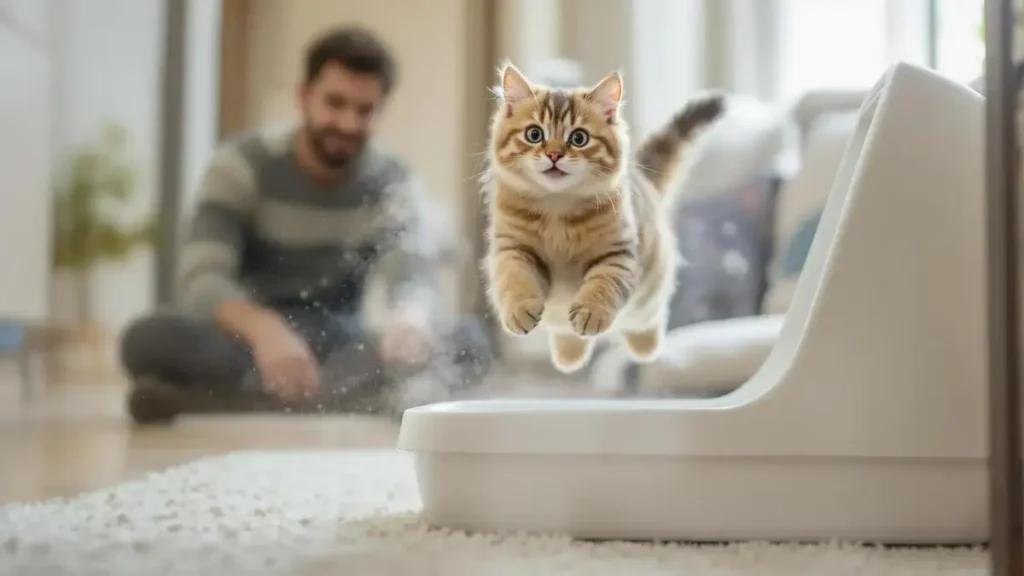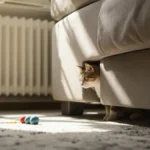The behavior of cats after defecation often raises questions in their owners. This agitation post-prandial can be linked to a profound sense of well being, resulting from physiological relief. Felines act according survival instincts, inherited from their wild ancestors, to minimize detection by predators. However, special attention is required, as unusual behavior can signal a pathology below.
Essential to know
- Cats show aagitation after the defecation.
- This behavior can reveal a physiological relief and a sense of well being.
- There odor escape after defecation it is an inherited instinct to avoid predators.
- Attention to behavior changes, which may indicate health problems.
Common behavior in cats
Cat owners have often noticed an intriguing phenomenon: a marked agitation of their feline after defecation. This behavior, which may seem curious, is actually quite common and deserves to be explored. How a cat behaves after going to the litter box can vary, but it is common to see them running, jumping, or even making happy vocalizations. This type of behavior is a good indicator of the dynamic and instinctive nature of these animals.
Sense of well-being
When your cat defecates, he often feels a sense of well being. This sensation can be attributed to the release of physical and emotional tension. Defecation is not simply a physiological necessity; it is also a time when the body releases hormones that cause a feeling of fullness and comfort. The act itself can therefore be a source of euphoria for the animal, thus making it more exuberant after having relieved itself.
Potential euphoria
The physiological relief following defecation can induce real euphoria in the cat. This phenomenon is probably linked to a positive stimulation of the nervous system, which leads to an increase in energy. Paradoxically, this moment of physical release can be accompanied by an increase in activity, pushing the cat to border on exuberance. This post-defecation reaction is a way for the cat to release its stress and celebrate this moment of comfort.
Cats will no longer think of your yard as a litter box thanks to this simple technique
Difference between defecation and urination
An important distinction to make is that between defecation and urination. Defecation involves a different physiological process that particularly stimulates the vagus nerve. This nerve is responsible for reducing stress, slowing the heart rate, and promoting a feeling of peace after a bowel movement. Thus, a cat may react differently after urinating, often without the explosive energy seen after defecation.
Survival instinct
The survival instinct plays a crucial role in cats’ behavior after defecation. In the wild, cats are hardwired to flee from the smell of their own feces, a signal that could attract predators. By taking time to exit the danger area after defecating, cats express this instinct inherited from their wild ancestors, which explains some of their agitated reactions.
Inherited behavior
This survival instinct, which drives them to minimize their detection by other animals, is largely a legacy of their wild ancestors. This irrational behavior can therefore be seen as a conditioned reaction, a true survival reflex. The fact that cats continue to behave this way, even in a safe home environment, shows how deeply ingrained these instinctive behaviors are.
Attention needed
However, it is essential to pay attention to any unusual behavior. If a cat shows signs of discomfort after using the litter box, this could indicate that there may be an underlying condition. For example, urinary tract infections or other health problems can be revealed by excessive agitation or avoidance of the litter box. Owners should therefore be alert to changes in their pet’s behavior. Signs of discomfort
Signs of discomfort in a cat, such as high-pitched meowing or attempts to hide their feces, can alert the owner to an abnormal situation. These manifestations should not be ignored, as they could indicate an urgent need to consult a veterinarian. Early diagnosis can prevent complications and ensure that the cat remains in good health.
Importance of a clean environment
The importance of a clean environment cannot be underestimated. An adequate litter box can make all the difference in terms of comfort for the cat. A clean place to defecate helps reduce stress and promote positive behavior. Cats are naturally sensitive animals, and a dirty litter box can cause them to engage in inappropriate behavior.
Veterinary Consultations
















